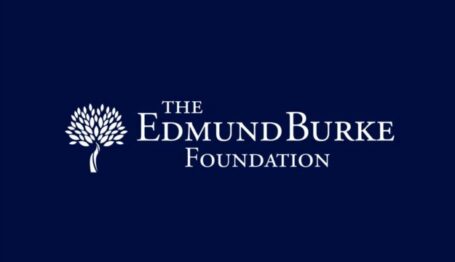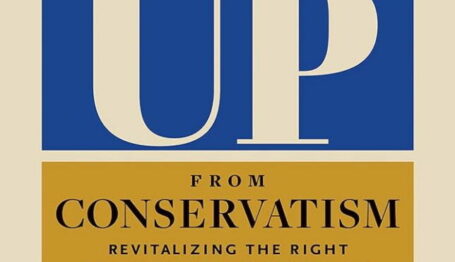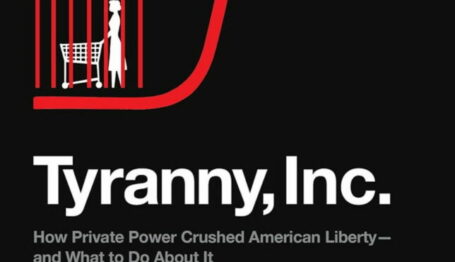Special Report
On the Question of Right Fights: Factions on the Right
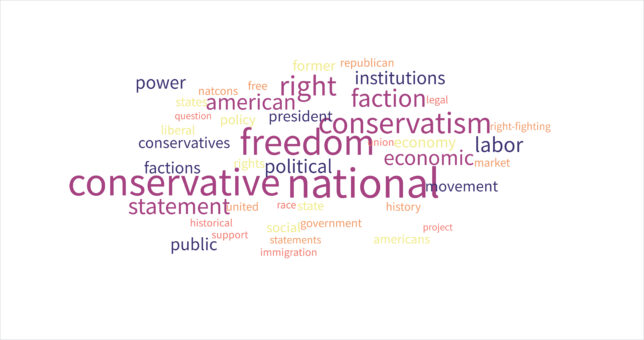 Credit: Jon Rodeback. License: Free Word Cloud Generator.
Credit: Jon Rodeback. License: Free Word Cloud Generator.

On the Question of Right Fights (full series)
Factions on the Right | Dueling Manifestos
National Conservatism at Arms | Postliberals for American Liberalism
“Grill Dad Republican”
The conservative intellectual movement has been blown apart by a combination of factors, including the political, economic, and foreign policy failures of the second term of President George W. Bush and his K Street Project allies in Congress; President Donald Trump’s political ascendancy in 2015–16 and the reactions to it from skeptical right-leaning intellectuals; the reactions to changing political coalitions and demographic dynamics like those discussed in The Emerging Democratic Majority; and longer-term economic cycles favoring high technology and services sectors over heavy manufacturing.
One consequence of splintering among right-of-center intellectuals is the publication of manifestos and ideological tomes as different factions try to climb to the top of the right wing’s greasy pole, with political patronage as the ultimate reward. Alongside the manifestos are collections of essays and new institutions, all existing as rallying points for intellectuals, activists, would-be political appointees, and social climbers who want their faction and their friends driving the “movement” forward.
Some tomes are book-length, such as Tyranny, Inc., journalist Sohrab Ahmari’s call to rediscover left-wing economics. Others consist of combative essays, like the Up from Conservatism collection edited by Arthur Milikh of the self-consciously radical Claremont Institute. And some are statements of principle or position, like the rival National Conservative and Freedom Conservative statements or the editorial recommitment of National Review.
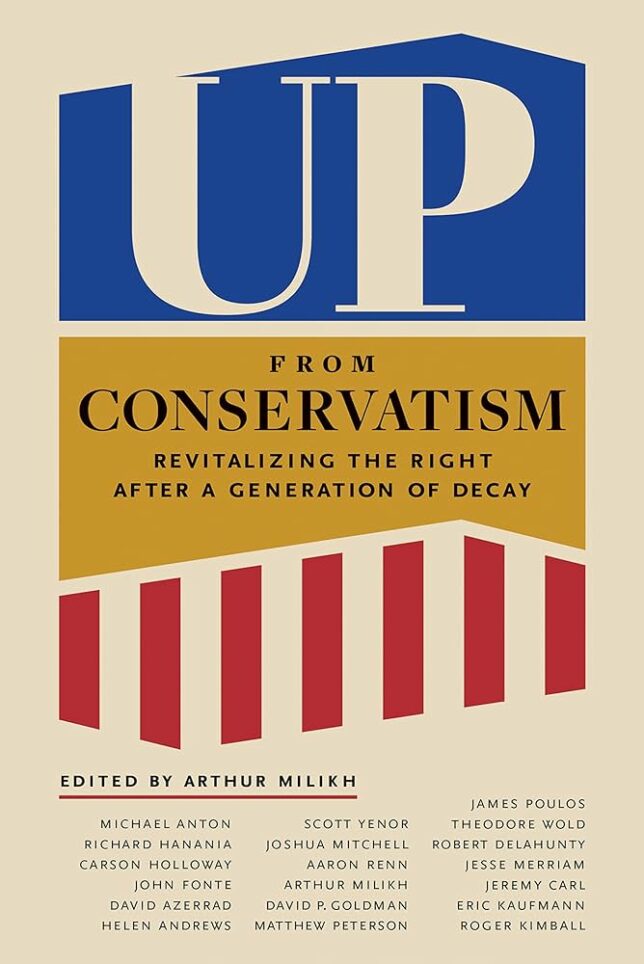
I come to this debate with a position of my own, of course. Of all factions, I would consider myself closest to the Freedom Conservative/National Review groups. Paeans to Pope Leo XIII and panicking at the inevitable power of capital-D Demographics are not what I seek from politics and public policy, while the first assertion of the FreeCons that “Among Americans’ most fundamental rights is the right to be free from the restrictions of arbitrary force” receives my hearty agreement. With my priors declared, I pray the reader will allow me to take them on a journey through the “right fights” that have kicked off.
Notes on Terminology
Part of right-fighting is staking out ideological ground using esoteric terminology. Defining where you stand is as important as standing where you stand. Lines between factions are blurry, and some writers, thinkers, and activists would align with multiple factions or none at all. And while the Beltway press often try to hammer square-peg right fights into the round hole of being for or against the 45th president of the United States, that vastly oversimplifies arguments made by people who, on all sides, have been at various times on all sides of 45. Likewise, some old delineators have lost meaning—most prominently “neoconservative,” which formerly referred to the liberal defectors of the 1970s and those of a Wilsonian mind in foreign policy in the 2000s.
So, a taxonomy of factions:
- Establishment. Pejorative that mars the target as a member of a moderate-to-liberal faction supposed to control the levers of power within the Republican Party and conservative movement. “Establishment” probably last accurately referred to the K Street Project, an alliance between former House Republican Leader Tom DeLay (R-TX) and Americans for Tax Reform’s Grover Norquist, who sought to seed former GOP staffers into K Street lobbying firms in the 1990s and 2000s after Republicans secured their first majority in the House of Representatives in a half-century.
- Freedom Conservative or FreeCon. Supporter of “Freedom Conservatism: A Statement of Principles,” the manifesto of their faction. The faction aligns with historical conservative positioning on individual freedom and open markets. It is more explicitly committed to governmental nonsectarianism and more open to immigration than the National Conservative faction. Notable FreeCons include former House Republican Leader Dick Armey (R-TX), former Florida Governor Jeb Bush (R), and Grover Norquist, the anti-tax activist who leads Americans for Tax Reform.
- Integralist. Supporter of a sectarian-Catholic social conservatism that does not significantly consider freedom or liberty as social goods, named for an ideological tendency in European authoritarian states during the 20th century that allied state power with the Catholic Church. Notable Integralists or people who have aligned with the Integralist cause include journalist Sohrab Ahmari, scholar and author Patrick Deneen, and legal theorist Adrian Vermeuele. See also Postliberal.
- Libertarian. Right-adjacent independent faction committed, in the words of the movement’s flagship magazine Reason, to promoting “free minds and free markets.” The faction is generally socially liberal, skeptical of the criminal justice system, and staunchly capitalist. Calling someone who is not a Libertarian, usually a FreeCon or someone considered Establishment, a Libertarian is pejorative.
- MAGA. Depending on the user, “MAGA” can be a self-descriptor or pejorative. The term is used to tie the target (which can be oneself) to former President Donald Trump and his “Make America Great Again” slogan.
- National Conservative or NatCon. Supporter of “National Conservatism: A Statement of Principles,” the manifesto of their faction. The faction is firmly nationalist in the context of the sovereignty of all nations, and the statement’s signers include international figures. The faction focuses more on national sovereignty and state power, especially to promote social-conservative aims, than the FreeCon faction. Notable NatCons include former U.S. Senator Jim DeMint (R-SC), activist Christopher Rufo of the Manhattan Institute, and political mega-donor and tech-industry figure Peter Thiel.
- New Right. Catch-all term for right-of-center factions that oppose the American conservative movement’s historical support for free-ish markets and individual liberty or wish to subordinate those positions to other goals. Includes NatCons and Integralists/Postliberals, but also institutions not formally aligned with any particular faction, like the liberal-funded think tank American Compass.
- Old Right. Pejorative term for supporters of historical Reaganite free-ish-market economic thinking.
- Populist. Synonym for “MAGA” or “NatCon,” depending on the user.
- Postliberal. Rebranding of “Integralist.” The term refers not to moving beyond American liberalism (indeed, the Postliberal faction finds American liberals of previous generations like Franklin Roosevelt highly praiseworthy) but instead to moving beyond classical liberalism and its concern for individual freedom.
- RINO. Pejorative meaning “Republican in Name Only.” Originally described the now almost extinct breed of actually left-of-center New England Yankees who were members of the GOP for ancestral or expedient purposes, such as former Sen. Lowell Weicker (R, later I-CT), Sen. Jim Jeffords (R, later I-VT), and Sen. Lincoln Chafee (R, later D-RI). Now used as a general attack term for anyone who takes a position against the speaker’s factional interests.
- Uniparty. Pejorative used to describe a supposed condition in which national Republicans and Democrats are allied in the service of capital-P Progressivism.
In the next installment, dueling manifestos show many similarities between National Conservatism and Freedom Conservatism.

